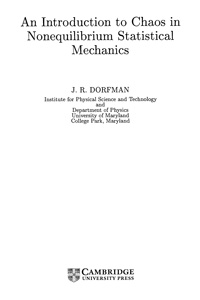An Introduction to chaos in nonequilibrium statistical mechanics
| Автор(ы): | Dorfman J. R.
06.10.2007
|
| Год изд.: | 1999 |
| Описание: | This book began its life as a set of lecture notes based on a series of lectures given to fourth year students at the Institute for Theoretical Physics at the University of Utrecht during the spring semester of 1994. The course of lectures was entitled From Molecular Chaos to Dynamical Chaos. At the suggestion of Prof. Matthieu Ernst, two students in the class, Lucas Neevens van Baal and Iris Lafaille, took notes, edited them, and prepared a LATEX manuscript that formed the basis for the lecture notes. The notes have undergone several revisions and many more corrective exercises to remove many errors that the author inadvertently added to the original LATEX file provided by Mr. van Baal and Ms. Lafaille. It is due to their hard work and desire to make the notes as clear as possible that the notes have made their reappearance as a book. |
| Оглавление: |
 Обложка книги.
Обложка книги.
1.1 Introduction [1] 1.2 The law of large numbers and the laws of mechanics [1] 1.3 Boltzmann's ergodic hypothesis [5] 1.4 Gibbs' mixing hypothesis [9] 1.5 Irregular dynamical motions [10] 1.6 Modern nonequilibrium statistical mechanics [11] 1.7 Outline of this book [14] 1.8 Further reading [18] 2 The Boltzmann equation [21] 2.1 Heuristic derivation [21] 2.2 Boltzmann's H-theorem [31] 2.3 Kac's ring model [34] 2.4 Tagged particle diffusion [39] 2.5 Further reading [47] 2.6 Exercises [47] 3 Liouville's equation [49] 3.1 Derivation [49] 3.2 The BBGKY hierarchy equations [51] 3.3 Poincare recurrence theorem [54] 3.4 Further reading [56] 3.5 Exercises [56] 4 Boltzmann's ergodic hypothesis [58] 4.1 Introduction [58] 4.2 Equal times in regions of equal measure [59] 4.3 The individual ergodic theorem [62] 4.4 Further reading [66] 4.5 Exercises [66] 5 Gibbs' picture: mixing systems [67] 5.1 The definition of a mixing system [67] 5.2 Distribution functions for mixing systems [70] 5.3 Chaos [71] 5.4 Further reading [74] 6 The Green-Kubo formulae [75] 6.1 Linear response theory [75] 6.2 van Kampen's objections [79] 6.3 The Green-Kubo formula: diffusion [83] 6.4 Further reading [87] 7 The baker's transformation [89] 7.1 The transformation and its properties [89] 7.2 A model Boltzmann equation [90] 7.3 Bernoulli sequences [94] 7.4 Further reading [97] 7.5 Exercises [97] 8 Lyapunov exponents, baker's map, and toral automorphisms [100] 8.1 Definition of Lyapunov exponents [100] 8.2 The baker's transformation is ergodic [104] 8.3 The baker's transformation and irreversibility [108] 8.4 The Arnold cat map [110] 8.5 Further reading [116] 8.6 Exercises [116] 9 Kolmogorov-Sinai entropy [118] 9.1 Heuristic considerations [118] 9.2 The definition of the KS entropy [119] 9.3 Anosov and hyperbolic systems, Markov partitions, and Pesin's theorem [122] 9.4 Further reading [127] 9.5 Exercises [127] 10 The Probenius—Perron equation [129] 10.1 One-dimensional systems [130] 10.2 The Frobenius-Perron equation in higher dimensions [133] 10.3 Further reading [135] 10.4 Exercises [135] 11 Open systems and escape rates [136] 11.1 The escape-rate formalism [136] 11.2 The Smale horseshoe [142] 11.3 The box-counting dimension [144] 11.4 The Lyapunov exponent for the repeller [147] 11.5 The escape-rate formula for hyperbolic systems [148] 11.6 Thermodynamic formalism for chaos [149] 11.7 Further reading [150] 11.8 Exercises [151] 12 Transport coefficients and chaos [152] 12.1 The escape-rate formalism [152] 12.2 Gaussian thermostats [154] 12.3 Further reading [161] 13 Sinai-Ruelle-Bowen (SRB) and Gibbs measures [163] 13.1 SRB measures [164] 13.2 The cumulative functions [168] 13.3 The SRB theorem [176] 13.4 Entropy in terms of SRB measures [178] 13.5 The Gallavotti-Cohen fluctuation formula [181] 13.6 Gibbs measures [183] 13.7 Further reading [193] 13.8 Exercises [194] 14 Fractal forms in Green-Kubo relations [195] 14.1 The Green-Kubo formula for maps [195] 14.2 A simple map and a simple fractal [197] 14.3 Further reading [202] 14.4 Exercises [202] 15 Unstable periodic orbits [203] 15.1 Dense sets of unstable periodic orbits [203] 15.2 The topological zeta-function [205] 15.3 Periodic orbits and diffusion [207] 15.4 Escape-rates and periodic orbits [208] 15.5 The generating function method for diffusion [211] 15.6 Periodic orbits and Gibbs measures [214] 15.7 Further reading [216] 15.8 Exercises [216] 16 Lorentz lattice gases [217] 16.1 Cellular automata lattice gases [217] 16.2 Chaotic behavior of Lorentz lattice gases [218] 16.3 The thermodynamic formalism [222] 16.4 Further reading [225] 16.5 Exercises [226] 17 Dynamical foundations of the Boltzmann equation [227] 17.1 The Arnold cat map [228] 17.2 The Boltzmann equation [232] 17.3 Stochastic equations [233] 17.4 The chaotic hypothesis [234] 17.5 The thermodynamic limit [234] 17.6 Further reading [238] 18 The Boltzmann equation returns [240] 18.1 The Lorentz gas as a billiard system [240] 18.2 Sinai's formula [242] 18.3 The extended Lorentz-Boltzmann equation [246] 18.4 Semi-dispersing billiard systems [251] 18.5 Summary [254] 18.6 Further reading [255] 18.7 Exercises [256] 19 What's next? [257] 19.1 Billiard systems [257] 19.2 Model systems [258] 19.3 Ruelle-Pollicott resonances [259] 19.4 Thermostatted systems [260] 19.5 Other approaches to transport [260] 19.6 Further applications of mathematical ideas [261] 19.6.1 Differential geometry [261] 19.6.2 Random matrix theory [262] 19.7 Random perturbations [262] 19.8 Quantum systems [263] 19.9 Experimental studies [264] 19.10 Problems for the future [265] Bibliography [267] Index [283] |
| Формат: | djvu |
| Размер: | 2437450 байт |
| Язык: | ENG |
| Рейтинг: |
386
|
| Открыть: | Ссылка (RU) |